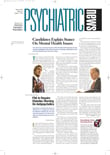A family-based intervention targeting depressed parents and their children helped children to understand parental depression better, improved family functioning, and led to fewer depressive symptoms in the children, according to a study in the August issue of Pediatrics.
“Currently, there is not enough attention paid to the needs of children whose parents are depressed,” William Beardslee, M.D., told Psychiatric News. Beardslee, the study’s lead author, is psychiatrist in chief at Children’s Hospital in Boston and the Gardner Monks Professor of Psychiatry at Harvard Medical School.
Beardslee and his colleagues recruited 93 dual- and single-parent families with 121 children throughout the early to mid-1990s in the Boston area in which at least one parent was depressed and randomized them to one of two interventions.
The first was a family-based approach to an intervention in which a nonmedical mental health clinician delivered two lectures to depressed parents about mood disorders and their effect on family functioning in general. During the lectures the clinician encouraged parents to talk with their children about their depression.
Beardslee developed the other intervention, known as the “family-based preventative intervention,” in the late 1980s while treating depressed parents and their children.
During the intervention, which typically lasts for six to 11 sessions, nonmedical mental health clinicians held individual and group meetings with parents and children.
Although psychologists, nurses, and social workers conducted the sessions, Beardslee described both interventions as “public health approaches” designed to be administered by a wide range of practitioners, including nonmedical mental health practitioners, psychiatrists, primary care practitioners, and pediatricians.
In the meetings, parents and children were taught about mood disorders and their effects on family functioning, and these effects were linked to families’ specific experiences. In addition, the clinician encouraged parents to assure children that they were not to blame for their parents’ depression.
The clinician also worked with parents to encourage children to pursue interests, relationships, and activities outside the home.
When the researchers assessed the families at four points up to 2.5 years after the interventions, they linked both interventions to a decrease in children’s depressive symptoms as evidenced by a drop in scores on the Youth Self-Report. However, the family-based intervention had more impact in other areas of functioning.
Beardslee found, for example, that for families that participated in the more intensive, family-based intervention, parents reported, on average, a greater number of positive changes in “child-related behavior and attitudes”— in other words, the ways in which parents interacted with their children.
For example, the parents in the family-based intervention reported better overall communication with their children or had more discussions about depression with their children than those in the lecture-based intervention. In addition, when such reports of child-related behavior were removed from the statistical analyses, children in the family-based intervention reported more change in their understanding of parental illness than had those in the lecture group.
As one child reported about his mother, “[I]t’s good to know that part of [the depression] is physical. It helps me to understand that she is ill.”
There was also a strong positive association between the amount of change children reported in their understanding of parental depression and the number of positive parent-child interactions. “Our intervention had a positive overall effect on family interactions, and that was our aim,” Beardslee told Psychiatric News.
The study was funded by grants from the National Institute of Mental Health and the William T. Grant Foundation.
Pediatrics 2003 112 e119
